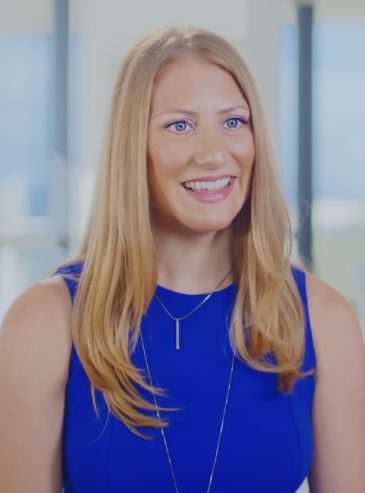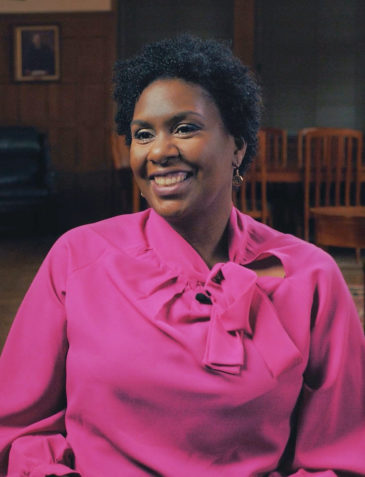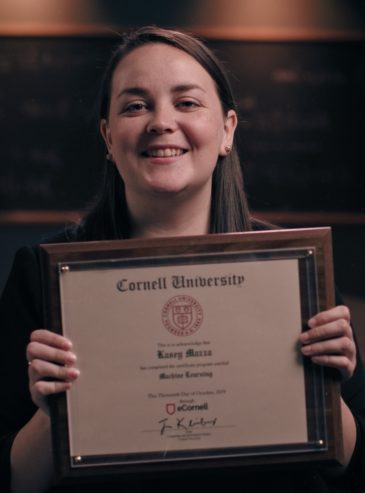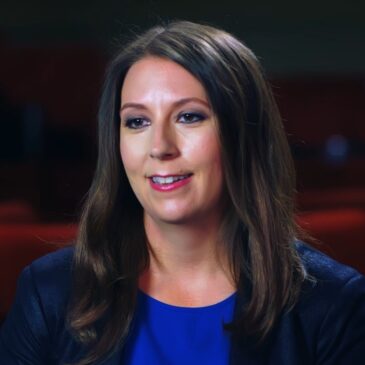STAND APART

Developing and launching new products involves more than a great idea. In today's fast-paced digital economy, understanding your target customers and their specific needs is essential to launching and managing successful products. In startups and established companies alike, the product manager serves as a key player in taking a product from idea to launch to success.
To bring viable products to market, a successful product manager needs to balance creative inspiration with a disciplined approach. Articulating a winning product means beginning with a hypothesis: You need to craft a simple statement that says, "We are going to help Person X solve Problem Y by doing Z," thus defining a specific customer, a specific problem, and a solution. In this course, you will do just that: Talk to customers, define problems, and come up with a product strategy and a plan for how you would actually build that product.
In this course, you will map your customer's journey and build personas. In doing so, you‘ll position yourself with a much clearer picture of the real problem your product is trying to solve, paving the way for a strong product strategy.
- Feb 25, 2026
- Mar 11, 2026
- Mar 25, 2026
- Apr 8, 2026
- Apr 22, 2026
- May 6, 2026
- May 20, 2026
Have you ever thought about why some products succeed and some fail? A product manager is responsible for the product's success. This all begins with setting a vision for the future where your stakeholders visualize how your product will improve your customers' lives. From there, you can begin to break down the specific goals you need to accomplish to make this future a reality. That helps you set the vision and articulate what a winning product looks like.
Visualizing and drawing the business is an important step in the process. In this course, you will discover how to break your business down into pieces so that you can carefully develop a winning strategy and focus on what matters. You'll examine how to visualize and draw the business, then identify the objectives and key results you'll rally the team to achieve.
The following course is required to be completed before taking this course:
- Developing a Product Hypothesis and Personas
- Feb 25, 2026
- Mar 11, 2026
- Mar 25, 2026
- Apr 8, 2026
- Apr 22, 2026
- May 6, 2026
- May 20, 2026
Product strategy is the critical link between your organization's long-term vision and its short-term execution. As a product manager, your ability to craft a clear strategy and roadmap — while gaining buy-in from key stakeholders — positions you to lead product development teams with confidence and impact.
In this course, you will discover how to define a structured framework for prioritization; source ideas from customers, team members, and stakeholders; and make informed decisions about which product features to pursue. You'll then apply these skills to build a backlog of high-impact projects and create a compelling product roadmap that clearly communicates what's coming next — as well as why it matters.
The following courses are required to be completed before taking this course:
- Developing a Product Hypothesis and Personas
- User Personas and Product Vision
- Feb 25, 2026
- Mar 11, 2026
- Mar 25, 2026
- Apr 8, 2026
- Apr 22, 2026
- May 6, 2026
- May 20, 2026
You have already done the work to answer critical questions regarding your target customer, your product, and the problem that your product will solve. Now it's time to design your product. In this course, you will address the product question, “How do we solve the problem in a way that delights our users and fits our strategy?”
You will examine how to create a prototype that simulates the product experience just well enough to get valuable feedback from potential customers. You'll also examine strategies for aligning the team and create a staffing plan that defines the team members, their roles and responsibilities, and potential areas for friction. You'll finish by writing a product requirements document (PRD), which is a pillar artifact that will rally the team and kick off the engineering and execution phase. This is an exciting moment when you prepare to pivot from analysis and planning to designing and building.
The following courses are required to be completed before taking this course:
- Developing a Product Hypothesis and Personas
- User Personas and Product Vision
- Feb 25, 2026
- Mar 11, 2026
- Mar 25, 2026
- Apr 8, 2026
- Apr 22, 2026
- May 6, 2026
- May 20, 2026
After launching a minimum viable product, a product manager needs to measure what's working and what's not then make quick adjustments. This is a key area in the product management process.
In this course, you will identify strategies for measuring progress, validating or updating product hypotheses, and presenting a path forward. You'll use recommended best practices to collect data to make calculated and informed decisions. You'll present what you have learned, propose related adjustments to your product strategy and roadmap, and consider your team's culture as you decide how to learn and iterate.
The following courses are required to be completed before taking this course:
- Developing a Product Hypothesis and Personas
- User Personas and Product Vision
- Feb 25, 2026
- Mar 11, 2026
- Mar 25, 2026
- Apr 8, 2026
- Apr 22, 2026
- May 6, 2026
- May 20, 2026
You made it this far by focusing on the customer, setting clear objectives and key results, building a roadmap, and determining how to articulate product learnings and make adjustments. The product manager now moves from planning and analyzing to building and launching a product.
In this course, you will identify strategies for partnering with an engineering team on a day-to-day basis as your team writes and releases code. You'll examine best practices for planning an engineering sprint, writing user stories, and managing and resolving issues. A product manager is accountable for building a delightful customer experience and achieving key objectives; you'll discover how to bring it all together so you can work with your team to build a successful product.
The following courses are required to be completed before taking this course:
- Developing a Product Hypothesis and Personas
- User Personas and Product Vision
- Feb 25, 2026
- Mar 11, 2026
- Mar 25, 2026
- Apr 8, 2026
- Apr 22, 2026
- May 6, 2026
- May 20, 2026

eCornell was truly one of the best investments I made in my entire career and it’s what brought me to where I am now.
eCornell was truly one of the best investments I made in my entire career and it’s what brought me to where I am now.

What I wanted was something that had an exceptional caliber of professionals and professors, and eCornell actually gave me that.
What I wanted was something that had an exceptional caliber of professionals and professors, and eCornell actually gave me that.
- View slide #1
- View slide #2
- View slide #3
- View slide #4
- View slide #5
top Minds
100% Online
that fit your life and career.
career



